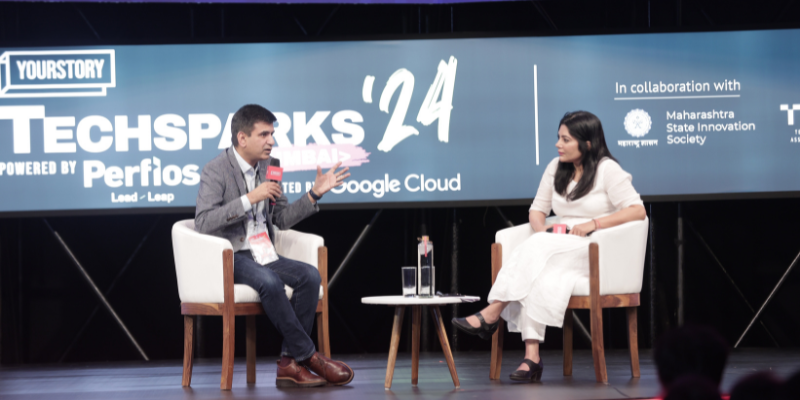
AI has become a transformative force across industries, shaping the way we work and interact with technology. In a recent discussion, at TechSparks Mumbai 2024, Amit Kumar, Director, Digital Native Sales, Google Cloud India, and Shradha Sharma, Founder and CEO, YourStory, discussed the concept of AI in depth, particularly in relation to its impact on entrepreneurs, startups, and individuals involved in various fields.
Embracing AI innovation
AI today is a catalyst to augment human potential. It is empowering professionals across industries and businesses to enhance experiences, collaborate, and build on competitive advantage.
“AI represents the potential for human beings to accomplish more, whether in business, personal lives, or specialised fields. It is helping developers to write better and faster code, doctors to enhance patient care, designers to innovate products, marketers to create impactful campaigns, and businesses to enhance customer experiences,” said Kumar during the fireside discussion.
Kumar shed light on the rapid integration of AI into various sectors, noting that, when considering AI, businesses needed to keep the importance of broader framework in mind that address crucial questions about data usage, competitive advantage protection, customer privacy, responsibility frameworks (especially regarding sensitive groups like children), brand values, and customer-centric strategies.
“It is very important to prioritise business goals like cost optimisation and enhancing customer satisfaction, rather than getting lost in the limitless possibilities that AI offers,” Kumar said. He emphasised the need to set realistic goals, ensuring that AI initiatives aligned with business needs and delivered tangible outcomes.
Safeguarding against cyber threats
With escalating concerns around cyber frauds, Kumar advocated for leveraging generative AI tools within cybersecurity setups to enhance resilience against evolving threats. “As attacks are getting more sophisticated, so is the defence.” He highlighted the significance of awareness, cautioning against unintentional data exposure due to lack of knowledge.
Kumar shared an example where employees unknowingly disclosed confidential information while using an LLM (Large Language Model). He stressed the importance of having a robust framework in place, to ensure data security and privacy for businesses.
“Having the right framework is important because eventually your data is a core value proposition,” he said. He also highlighted the dual importance of informed decision-making and strategic partnerships in navigating the complexities of cybersecurity and AI integration.
Versatile AI models
Kumar shared insights into Google Cloud’s approach to AI models, particularly highlighting the versatility and specialisation offered by their platform.
“We don’t believe that this is a single model world for our enterprise customers. We believe in the concept of being open,” Kumar said. This philosophy allows Google Cloud customers to choose from a diverse range of 130 models, including open-source and competitor models.
Kumar emphasised the importance of selecting the best model that suits specific needs, noting that no single model can address all queries. He discussed the trend towards specialisation in AI models, citing examples like Gmail, which is a smaller model designed for specific tasks with fewer parameters and lower operational costs.
Kumar highlighted existing specialised models like MedPalm for the medical industry and SecPalm for cybersecurity, showcasing the diverse applications of AI in various business sectors, including risk assessment and credit disbursement. He also spoke about ongoing collaborations on building language-specific models tailored for Indian needs and highlighted the company’s commitment to serving Indian customers by collaborating with local partners for AI development in the Indian context.
Empowering businesses with AI
In the discussion, Kumar elaborated on the company’s strategy for integrating AI into businesses, emphasising the importance of practicality and solutions tailored to individual needs.
“Our approach involves engaging with customers through hackathons to educate them about available AI tools and encourage them to envision how technology can benefit their specific business challenges,” he added.
He also spoke about Google Cloud’s credit programme for startups to ease into technology adoption, recognising the financial constraints young companies may face. “We also invest in developer training initiatives in collaboration with partners and government entities like ONDC, with the aim to train a million developers on GenAI,” he added.
Amit highlighted Google’s vision for AI, characterised by boldness in outcomes and a strong sense of responsibility. He emphasised the importance of responsible AI practices, ensuring fairness, security, and eliminating biases in AI systems. “Our commitment is to constantly assess AI functionalities and align it with our core values of being both bold and responsible in driving AI innovation and deployment,” Kumar said.





![Read more about the article [Weekly funding roundup Nov 16-22] Zepto effect boosts VC inflow to 2nd highest for 2024](https://blog.digitalsevaa.com/wp-content/uploads/2024/04/funding-roundup-LEAD-1667575602969-300x150.png)




